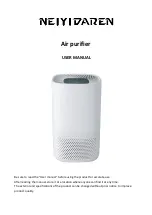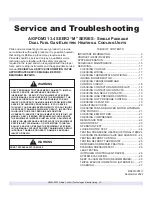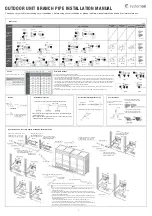
3
Safety Precautions
•
Keep this manual where the user can easily find it.
•
Read the precautions in this manual carefully before operating the unit.
•
This appliance is intended to be used by expert or trained users in shops, in light industry and on farms, or for commercial use
by lay persons.
•
Sound pressure level is less than 70 dB (A).
•
The precautions described herein are classified as WARNING and CAUTION. They both contain important information
regarding safety. Be sure to observe all precautions without fail.
WARNING
CAUTION
Failure to follow these instructions properly may result in
personal injury or loss of life.
Failure to observe these instructions properly may result in
property damage or personal injury, which may be serious
depending on the circumstances.
Never attempt.
Be sure to follow the
instructions.
Be sure to establish an earth
connection.
•
After reading, keep this manual in a convenient place so that you can refer to it whenever necessary. If the equipment is
transferred to a new user, be sure also to hand over the manual.
WARNING
•
In order to avoid fire, explosion or injury, do not operate the unit when harmful gases (e.g. flammable or corrosive)
are detected near the unit.
•
Be aware that prolonged, direct exposure to cool or warm air from the air conditioner, or to air that is too cool or too
warm can be harmful to your physical condition and health.
•
Do not place objects, including rods, your fingers, etc., in the air inlet or outlet. Product damage or personal injury
may result due to contact with the air conditioner’s high-speed fan blades.
•
Do not attempt to repair, dismantle, reinstall or modify the air conditioner yourself as this may result in water leakage,
electric shocks or fire hazards.
•
Do not use flammable spray near the air conditioner, or otherwise fire may result.
•
Do not use a refrigerant other than the one indicated on the outdoor unit (R410A) when installing, moving or
repairing. Using other refrigerants may cause trouble or damage to the unit, and personal injury.
•
To avoid electric shocks, do not operate with wet hands.
•
Beware of fire in case of refrigerant leakage. If the air conditioner is not operating correctly, i.e. not generating cool or
warm air, refrigerant leakage could be the cause. Consult your dealer for assistance. The refrigerant within the air
conditioner is safe and normally does not leak.
However, in the event of a leakage, contact with a naked burner, heater or cooker may result in generation of noxious
gas. Do not use the air conditioner until a qualified service person confirms that the leakage has been repaired.
•
Do not attempt to install or repair the air conditioner yourself. Improper workmanship may result in water leakage,
electric shocks or fire hazards. Please contact your local dealer or qualified personnel for installation and
maintenance work.
•
When the air conditioner is malfunctioning (giving off a burning odour, etc.) turn off power to the unit and contact your
local dealer. Continued operation under such circumstances may result in a failure, electric shocks or fire hazards.
•
Be sure to install an earth leakage circuit breaker. Failure to install the earth leakage circuit breaker may result in
electric shocks or fire.
•
Be sure to earth the unit. Do not earth the unit to a utility pipe, lightning conductor or telephone earth lead. Imperfect
earthing may result in electric shocks.
CAUTION
•
Do not use the air conditioner for purposes other than those for which it is intended. Do not use the air conditioner for
cooling precision instruments, food, plants, animals or works of art as this may adversely affect the performance,
quality and/or longevity of the object concerned.
•
Do not expose plants or animals directly to airflow from the unit as this may cause adverse effects.
•
Do not place appliances that produce naked flames in places exposed to the airflow from the unit as this may impair
combustion of the burner.
•
Do not block air inlets nor outlets. Impaired airflow may result in insufficient performance or trouble.





































